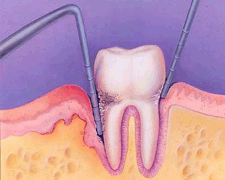المقالات
3 Month Recare

If you have a history of periodontal disease, we must monitor the health of your gums closely so that we can prevent a recurrence of this destructive infection.
Periodontal disease can never be cured; it can only be controlled. And if it isn't carefully monitored and controlled, periodontal disease can eventually cause you to lose your teeth.
We must monitor your gums closely If we've diagnosed periodontal disease, we'll usually recommend a form of periodontal therapy called scaling and root planing to remove the infection from beneath your gums. Following this treatment, we'll have you come to see us every few months for ongoing care, which may include x-rays, re-evaluation of your periodontal health and the effectiveness of your homecare, removal of plaque above and below the gum line, and re-treatment with scaling and root planing if necessary. These frequent checkups are vital for controlling your periodontal disease.
Periodontal disease is site-specific. This means that you may experience a flare-up of the infection in just one periodontal pocket out of the possible total of 192 that exist in your mouth. Bone and tissue loss may occur in only this isolated area, or it may be more widespread. If we aren't checking regularly for this type of damage to your gums and bone, you might not notice that it's occurring, and the destruction would continue unchecked.
Some bacteria do remain after treatment, and they may settle back into the pocket and once again begin the process of reproducing and destroying bone and soft tissue. In as few as 90 days, the bacteria can reach destructive levels once again. Because of the episodic nature of periodontal disease, and in light of the fact that periodontal disease can reestablish itself in as few as 90 days, the typical 6-month re-care appointment just isn't enough for those with a history of periodontal disease. Statistics confirm that re-evaluation at intervals of at least every 3 or 4 months is critical for periodontal patients. This helps us break the stronghold of bacteria in your gums, minimize the recurrence of the infection, and slow or eliminate its destructive effects.
